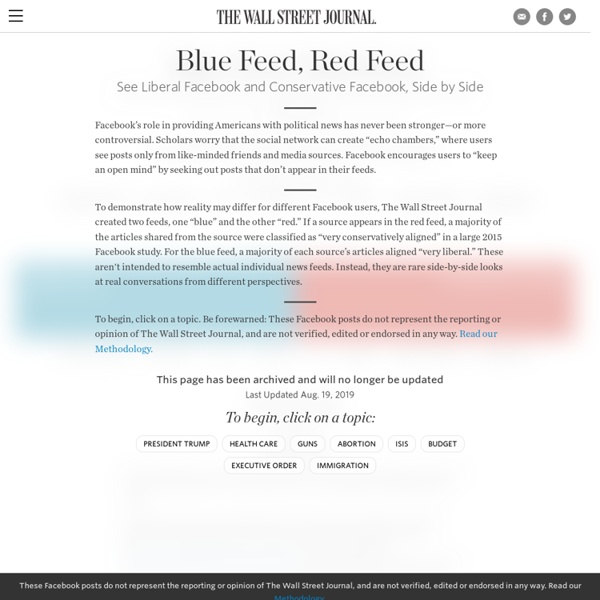Blue Feed, Red Feed

https://graphics.wsj.com/blue-feed-red-feed/
Related: FAKE NEWS
• MIK
Four scientific theories that were proven wrong
Nothing enforces humility more rigorously than science, the powerful idea that being wrong is not something to be ashamed about, but rather something to be openly embraced, as it has the potential to open up new doors to progression and innovation in the sciences. When scientists are wrong, they are motivated to change their views when some new evidence comes along that contradicts these views. This humble disposition tends to go against the grain of human nature, which assigns a high value to being right all the time and entails that being wrong is the worst of all outcomes and should therefore be avoided at all costs.
Debate.org
NBC News - Breaking News & Top Stories - Latest World, US & Local News
Fact-checking and accountability journalism project Archives
The American Press Institute’s Accountability Journalism and Fact-Checking Project aims to increase and improve fact-checking and other accountability journalism practices. The project, which began as a grant-funded initiative, supports research to improve political fact-checking, and works with news organizations to significantly increase and improve accountability journalism practices as well as contribute to public debates on the topic. You can follow the work of the project here, and get top advice from experts on our Better News fact-checking resource page. Sign up for the weekly newsletter or enroll in our free online course.
Münchausen by internet: the sickness bloggers who fake it online
How would you fake cancer? Shave your head? Pluck your eyebrows? Install a chemo port into your neck?
New York Times: Room for Debate
HeadlineSpot.com: US Newspapers Online News Headlines, World News, Current Events.
Debunking Fake News
In late December, FactCheck.org agreed to help identify and label viral fake news stories flagged by Facebook users. We are one of several organizations that are part of Facebook’s initiative to combat the spread of viral deceptions. We are now increasing our efforts with the financial support of Facebook: In recent weeks, we have published an increasing number of stories debunking fake news and we will continue to do so. We now have a link on our homepage (see image below) that directs readers to the stories that we write as part of the Facebook initiative.We now provide a list of websites that have published fake and satirical stories. We will add to that list as we come across more sites.We also provide a guide on how to flag stories on Facebook that you suspect are fake, so that you can help us in our efforts to combat viral deceptions.
Det nya Medielandskapet - Folkbildningsnätet
Det nya medielandskapet påverkar hur vi lär oss, vad vi lär oss och av vem. Det påverkar våra relationer och vårt sätt att tänka. Medie- och informationskunnighet - MIK - är idag en nödvändig kompetens. Här tipsar vi om hur du kan börja resan in i det nya medielandskapet med fakta, utbildningspaket och filmer från seriösa aktörer. Statens medieråd Lär om medier tar upp olika aspekter av att kunna hantera dagens informationflöde.
Global Issues : social, political, economic and environmental issues that affect us all — Global Issues
Standards for the 21st-Century Learner
Skip to main content ALA User Menu A Division of the American Library Association
The Critical Thinking Skills Cheatsheet [Infographic]
Critical thinking skills truly matter in learning. Why? Because they are life skills we use every day of our lives. Everything from our work to our recreational pursuits, and all that’s in between, employs these unique and valuable abilities. Consciously developing them takes thought-provoking discussion and equally thought-provoking questions to get it going. Begin right here with the Critical Thinking Skills Cheatsheet.
Related:



